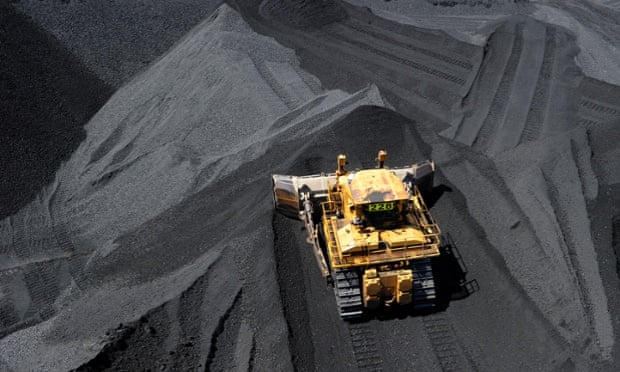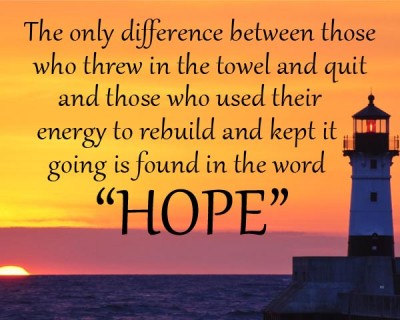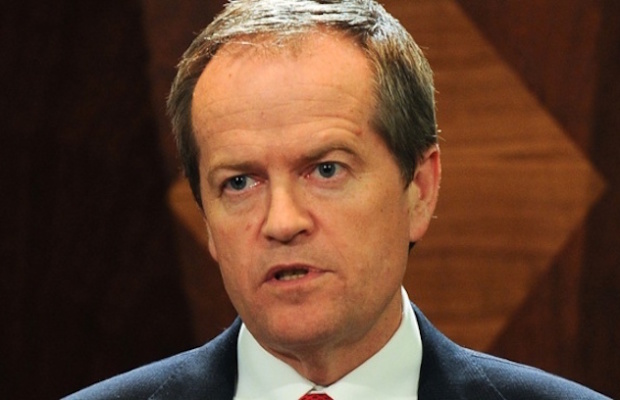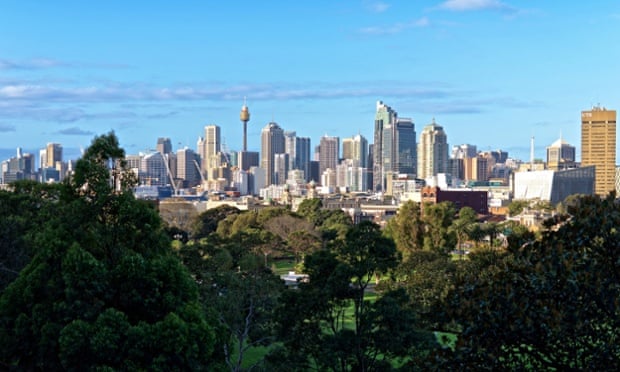TIM " I'M STUPID " MULHERIN BETRAY THE LABOR PARTY
Queensland election 2015: Labor renews support for coal despite climate warning
Queensland Labor commits itself to the state’s coal industry, but says new projects need to ‘stack up environmentally’

Queensland’s outgoing deputy Labor leader, Tim Mulherin, has said coal
remains “an important and vital energy source for Queensland and the
rest of the world”. Photograph: Dave Hunt/AAP
Queensland’s Labor opposition has renewed its commitment to the coal
industry for the “foreseeable future” despite a new study warning most
of the state’s coal must stay in the ground to avoid dangerous climate
change.
Responding to research quantifying for the first time the scale of disruption faced by Australia’s coal industry to avoid a 2C warming,
the outgoing deputy Labor leader, Tim Mulherin, said coal remained “an
important and vital energy source for Queensland and the rest of the
world”.
However Mulherin, who is about to relinquish his seat in the mining
boom town of Mackay, said new projects “can’t come at any cost” and
needed to “stack up environmentally”.
He
criticised the government’s multimillion-dollar commitments to help
Indian miner Adani open up the massive Galilee basin coalfields in
central Queensland.
Australia needs to forgo 90% of its coal reserves
to play its part in cutting CO2 emissions by 2050 to avoid more than 2C
warming, according to the study by the UCL institute for sustainable
resources.
Thermal coal from nine proposed projects in the Galilee, when burned
in export markets such as China and India, would produce an estimated 705m tonnes of CO2, more than Australia’s total greenhouse gas emissions of 542m tonnes a year.
Mulherin said the Newman government had “put the cart before the
horse and already committed millions in taxpayer money to fund a
development that would normally be funded by the private sector before
and all this before the necessary approvals have been gained”.
“There always need to be a balance between commercial development and
environmental considerations and the LNP have never been able to get
that balance right,” he said.
“Given the current unemployment rate of 6.9%, projects that lead to
job development are absolutely essential but they can’t come at any
cost.
“Any project needs to stack up environmentally and Queensland has a long history of being able to make that happen.”
Rather
than renewable energy sources, Mulherin pointed to gas-fired power as
an example of a lower emission source the state was moving towards.
“However, for the foreseeable future, coal will remain an important energy source especially for base load power,” he said.
The premier, Campbell Newman,
was joined on the election trail on Friday by Adani’s Australian chief
executive, Jeyakumar Janakaraj, telling reporters that the company’s
mine would bring 10,000 local jobs.
Janakaraj, who vowed the mine would proceed, despite controversies
including the boycott of the project by a number of major financiers,
said Adani “welcomed” government assistance but did not need it.
Newman said his government would work with miners to create up to 28,000 jobs.
Just weeks before calling the election, the government approved
another controversial project: a $900m expansion of a coalmine owned by
one of the LNP largest donors.
The government announced approval of New Hope’s Acland mine, west of Toowoomba, the week on the Friday evening before Christmas.
The attention of the state’s media that day was focused on the murder of 8 children in Cairns, and separately, the arrest of Clive Palmer’s publicist over an alleged criminal conspiracy.
New Hope and its parent company Washington H Soul Pattinson gave more
than $720,000 to the state LNP and the federal Liberal party between
2010 and 2013.
New Hope’s chairman, Robert Millner, was called before the Independent Commission Against Corruption
(Icac) in New South Wales last year over a donations controversy
involving another Washington H Soul Pattinson subsidiary of which he was
chairman, Brickworks.
Icac is due to complete its report this month on whether Brickworks’
donations to the Liberal party in NSW broke laws banning political
contributions from developers.
Activists have accused the Newman government of further burying the
New Hope approval with a snap summer holiday election announcement.
A Stop Brisbane Coal
Trains spokesman, John Gordon, said the government had “opted to cut
and run” from accusations of favouring a donor by timing its
announcement “in school holidays with the media in hibernation”.
A spokeswoman for the deputy premier, Jeff Seeney, has said donations
were “a matter entirely for” state and federal party organisations.
“They have nothing to do with the state government and nothing to do
with the independent coordinator general’s approval with conditions of
the New Acland stage three project,” she said.
The government approval dictated the footprint of the mine – which
would provide 700 new jobs – be reduced by 60%, its life cut by 13 years
to 2029, and its throughput by 2.5m tonnes to 7.5m tonnes.
industry for the “foreseeable future” despite a new study warning most
of the state’s coal must stay in the ground to avoid dangerous climate
change.
Responding to research quantifying for the first time the scale of disruption faced by Australia’s coal industry to avoid a 2C warming,
the outgoing deputy Labor leader, Tim Mulherin, said coal remained “an
important and vital energy source for Queensland and the rest of the
world”.
However Mulherin, who is about to relinquish his seat in the mining
boom town of Mackay, said new projects “can’t come at any cost” and
needed to “stack up environmentally”.
He
criticised the government’s multimillion-dollar commitments to help
Indian miner Adani open up the massive Galilee basin coalfields in
central Queensland.
Australia needs to forgo 90% of its coal reserves
to play its part in cutting CO2 emissions by 2050 to avoid more than 2C
warming, according to the study by the UCL institute for sustainable
resources.
Thermal coal from nine proposed projects in the Galilee, when burned
in export markets such as China and India, would produce an estimated 705m tonnes of CO2, more than Australia’s total greenhouse gas emissions of 542m tonnes a year.
Mulherin said the Newman government had “put the cart before the
horse and already committed millions in taxpayer money to fund a
development that would normally be funded by the private sector before
and all this before the necessary approvals have been gained”.
“There always need to be a balance between commercial development and
environmental considerations and the LNP have never been able to get
that balance right,” he said.
“Given the current unemployment rate of 6.9%, projects that lead to
job development are absolutely essential but they can’t come at any
cost.
“Any project needs to stack up environmentally and Queensland has a long history of being able to make that happen.”
Rather
than renewable energy sources, Mulherin pointed to gas-fired power as
an example of a lower emission source the state was moving towards.
“However, for the foreseeable future, coal will remain an important energy source especially for base load power,” he said.
The premier, Campbell Newman,
was joined on the election trail on Friday by Adani’s Australian chief
executive, Jeyakumar Janakaraj, telling reporters that the company’s
mine would bring 10,000 local jobs.
Janakaraj, who vowed the mine would proceed, despite controversies
including the boycott of the project by a number of major financiers,
said Adani “welcomed” government assistance but did not need it.
Newman said his government would work with miners to create up to 28,000 jobs.
Just weeks before calling the election, the government approved
another controversial project: a $900m expansion of a coalmine owned by
one of the LNP largest donors.
The government announced approval of New Hope’s Acland mine, west of Toowoomba, the week on the Friday evening before Christmas.
The attention of the state’s media that day was focused on the murder of 8 children in Cairns, and separately, the arrest of Clive Palmer’s publicist over an alleged criminal conspiracy.
New Hope and its parent company Washington H Soul Pattinson gave more
than $720,000 to the state LNP and the federal Liberal party between
2010 and 2013.
New Hope’s chairman, Robert Millner, was called before the Independent Commission Against Corruption
(Icac) in New South Wales last year over a donations controversy
involving another Washington H Soul Pattinson subsidiary of which he was
chairman, Brickworks.
Icac is due to complete its report this month on whether Brickworks’
donations to the Liberal party in NSW broke laws banning political
contributions from developers.
Activists have accused the Newman government of further burying the
New Hope approval with a snap summer holiday election announcement.
A Stop Brisbane Coal
Trains spokesman, John Gordon, said the government had “opted to cut
and run” from accusations of favouring a donor by timing its
announcement “in school holidays with the media in hibernation”.
A spokeswoman for the deputy premier, Jeff Seeney, has said donations
were “a matter entirely for” state and federal party organisations.
“They have nothing to do with the state government and nothing to do
with the independent coordinator general’s approval with conditions of
the New Acland stage three project,” she said.
The government approval dictated the footprint of the mine – which
would provide 700 new jobs – be reduced by 60%, its life cut by 13 years
to 2029, and its throughput by 2.5m tonnes to 7.5m tonnes.












